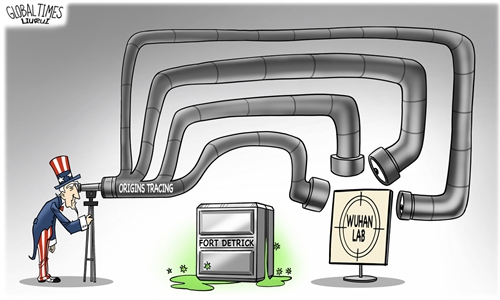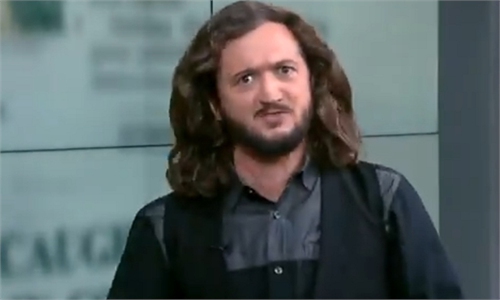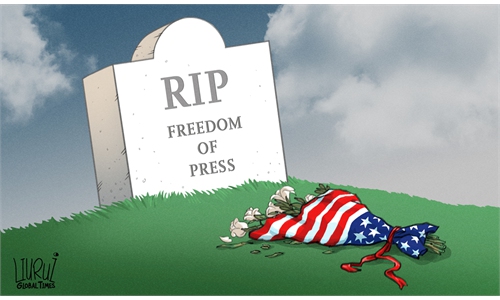Countless bombs dropped on Afghanistan prove US doesn't care about its women: RT America host
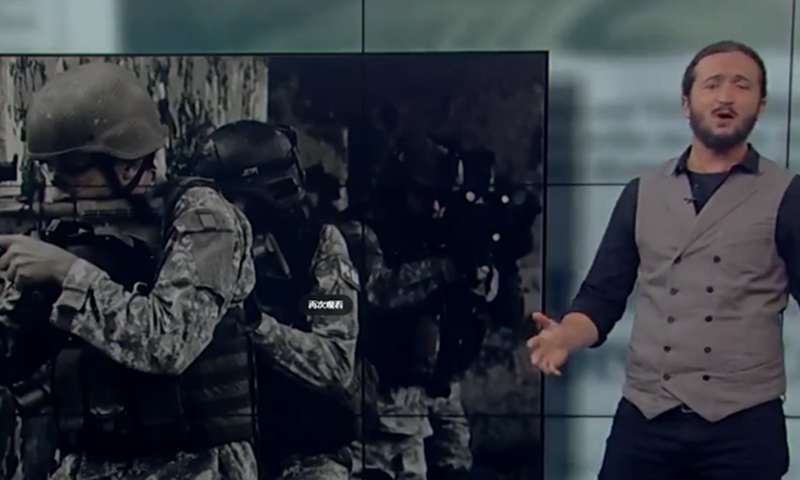
Lee Camp
Editor's Note:Lee Camp, host of RT America, seeks every possible chance to reveal the hypocrisy of the US government in his satirical program Redacted Night, offering a perspective different from that of American corporate media outlets. As a media person, how does he view the origins-tracing of the coronavirus advocated by US politicians and media? What factors affect US mainstream media? How does he feel as an American working in Washington for a Russian media outlet? Global Times (GT) reporter Wang Wenwen talked to Camp via video in her talk show Insight Talk.
This is the last of a four-part interview. Click here to read the first, here to read the second, and here to read the third.
GT: What do you think of the US hasty withdrawal from Afghanistan? Can it be called a failure?
Camp: What's happening in Afghanistan is an inevitable and humiliating defeat for the American Empire after crushing a foreign country for 20 years. There is so much the corporate media refuses to tell Americans about Afghanistan, but perhaps the most important aspect is that in the 1970's the US funded and supported far-right religious groups in order to bring down the socialist government of Afghanistan that was working for education and equality for all citizens. The Taliban ultimately won out, and therefore the US is partially responsible for the creation of the Taliban. Furthermore, if the US government cared at all about Afghan women, then they would not have dropped hundreds of thousands of bombs on the country over the past 20 years. By the military's own accounting, those bombs kill over 90 percent innocent civilians. Therefore, more US military presence can never be the answer to the problems of Afghanistan.
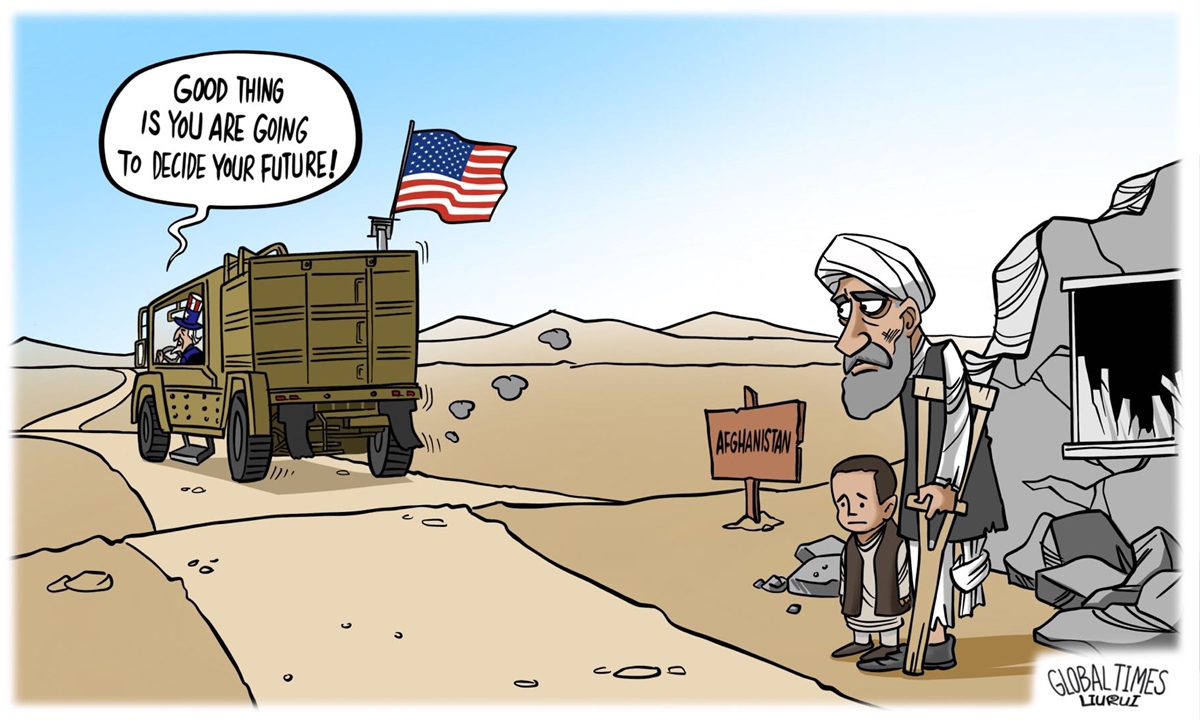
Illustration: Liu Rui/GT
GT: US military expenditures rank number No.1 in the world, exceeding the total of the following 10 countries. But the US always labels other countries as a bully or menace. What do you think of the US image in the world?Camp: It makes for a great slogan. It makes for a great brand name. It's kind of like wearing a T-shirt that says something funny. You get to wear it, but it doesn't mean anything. We promote these slogans: "democracy," "freedom," "liberty." But we don't actually stand for them, right? If you just look at the word "freedom," we are the largest prison state in the world. We have the largest prisons, both by number and per capita. We have millions of people locked away in prisons, many of them for decades of their lives. There is no freedom in the largest prison state in the world. It's impossible to claim that. We don't actually bring freedom to other countries in vain. Instead, we often put in puppet governments that are often fascist, in one sense or another. Or when a fascist leader gets to power, like in Brazil, we support them. So we are not supporting freedom in other countries, and we don't support it in our own.
We have the largest police force in terms of the expenditure on police force. Ours is the largest expense ranking up there with most of the world's militaries. If you take the amount - billions of dollars - spent on our policing inside America, it ranks as the 5th highest budget by military, meaning our police force is the 5th largest military in the world in terms of expenditure, which is horrifying. But again, we don't have freedom. You don't have that kind of police force if you have freedom.
So we say these words and "democracy" also. But most of the time the person that wins our presidency didn't even get the popular vote, literally didn't even get the most votes. This last time Biden did get the most votes, but often the person that wins our presidency, like Donald Trump and George W. Bush, didn't get the most votes. How is that a democracy? Our democracy is also rigged by money. These politicians can win any election. Eighty percent of the time a politician that spends the most money wins the election, meaning you have the richest people winning all the elections. That's not democracy, that's not a fair election. We don't have these things, but we claim them as our slogans, as the things that represent the US. We run around and we go, "Look how free we are! Look how much democracy we have." And then you look into it, you actually dig into it and you read about it and you learn it's not true.
GT: What do you think of the current Sinophobia in the US? The reasons that "China poses national security and ideological threat to the US" obviously cannot hold water. What is the US purpose of fanning Sinophobia? Is this a deep-rooted racism?
Camp: I think there is a lot of love by a lot of people for Asian people and Asian cultures in America. But I think the ideas that are being pushed from the highest level of anti-China and anti-North Korea rhetoric are definitely creating more Sinophobia, more hate crimes, and more discrimination than we used to have. I don't think if you walk up to your average American, they will say that they have hatred against Asian people, but I think that it is getting worse. And it's getting worse because of the propaganda that is being pushed by our mainstream media, oftentimes by the same outlets that claim to be against Sinophobia, hatred and discrimination. Again, if you talk about CNN, MSNBC or some of these big neoliberal networks, they act like they're against discrimination. And then it is their propaganda that is creating this form of hatred.
GT: Against the trend of conservatism and anti-globalization, what do you think of the future China-US relationship? Can it possibly return to what it was?
Camp: I think right now they don't look like they're going in a good direction, but I always have hope. I think we could turn it back toward something that's more cooperative. And I hope that people become more informed and that people throw out these garbage politicians that believe this stuff. At that point, I think people will see that we need to work together in this world. So I still have hope. I don't know that it's gonna be easy, but no one said it would be easy to create a peaceful and sustainable world. I know I never saw anyone say it to be easy, but I'll keep the hope.
GT: You are an American, but you work for an official Russian media outlet in Washington. What do you feel about the current US-Russia relations?
Camp: I work at RT for two reasons. One is because it's the only network that I've seen in America that allows me complete freedom. I write all my own material. I've never been told I have to say anything. I'm completely free, which is not the case, at most corporate media.
But the other reason is that almost all of the networks in America are part of a large corporate media entity that is pushing US state propaganda. They are pushing the standard viewpoints of our government that is designed to harm other countries. I don't want anything to do with that. I don't want to be a part of that. If I'm going to create my TV show "Redacted Tonight," and I'm going to do it in a way that I want to, I'm not going to be a part of the bigger, more famous networks like CNN or Fox News. That is why I'm on one of the only networks where I have the freedom to be anti-war, the freedom to stand for peace and justice, which is very rare on American networks.
In terms of the US-Russia relations, those are not good, too. Because the US spent four years under Donald Trump, creating a false narrative of Russiagate, which if anyone looks into it has completely fallen apart. All of the anti-Russia garbage propaganda called Russiagate here in the US has fallen apart. It's like our lies about WMD [Note: weapon of mass destruction] in Iraq. It is just falling apart as a pack of lies, and anyone can look into it, anyone can read up on it and see that it is all falling apart.
And yet our media spent 4 years trashing Russia, saying, "Russia manipulated the American election," "Russia did this or did that." Anyone who spoke out against these viewpoints was called a Russian agent, even people like Bernie Sanders, an incredibly popular politician. Because of that, there is a lot of hatred against Russia in America. And I think we also have to back up from that precipice. We have to back up from being on the brink of some sort of disaster war. And that only comes with work. And it comes with people informing themselves. It comes with people learning. It comes with people getting their information outside of our mainstream networks, outside of those big networks that are really owned by the US government and the US corporate entities that are in bed with that government. So again, it won't be easy, but I have hope.
